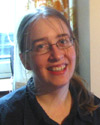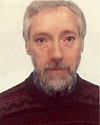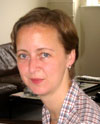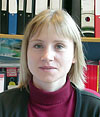 |
 |
 |
 |
 |
 |
|
|
||||
|
FEATURE |
Contributors |
|||
 |
I first became interested in learner's dictionaries more than 10 years ago while teaching English in Lithuania. I became a lexicographer with Cambridge University Press in 1999 and since then I have been involved in several ELT publications including Cambridge Advanced Learner's Dictionary, Cambridge Learner's Dictionary, the CD-ROM versions of the Macmillan English Dictionary and Macmillan Essential Dictionary as well as the Macmillan Schools Dictionary website. I have contributed to several websites – writing articles, designing web pages as well as adapting and creating interactive activities and games. I work from my home in Perthshire and most of my spare time is taken up with my baby son Aonghas (Gaelic for 'Angus') and walking my parents' border collie, Misty.
|
|||
 |
I come from Leeds. I did my first degree at the University of Cambridge, and then a Postgraduate Certificate in Education, during which I quickly abandoned my ambition to teach children in the UK state system. But at the end of that year I got a summer job teaching English as a foreign language to adults, found that I liked it, and I've never looked back since. I've lived in Poland since 1991. I live in As well as Inside Teaching (Macmillan), I'm co-author of The Pronunciation Book (Longman), one of the authors of Bridges (Klett) — an adult course for German-speaking learners — and the PONS Polish-English Dictionary (LektorKlett). At the moment I'm working on pronunciation materials for Polish and international readerships, and starting work on another Polish-English dictionary. I like studying languages and tracing connections between them, and I'm — still — intrigued by the question: Given that so many people in the world learn foreign and second languages informally, without books, teachers and so on, how can formal instruction help most effectively, as opposed to interfering with the learning process? I'm also keen on walking, travelling by train, photography, history, architecture, landscape, folklore and so on. I spend an enormous amount of time listening to music, and if I get reincarnated I want to be a musician next time round.
|
|||
 |
Kerry has a first degree in computational linguistics and an MA in theoretical linguistics from the University of Manchester, specialising in syntactic theory. For several years she worked as a researcher at Manchester and Essex universities, where in connection with European projects on machine translation, she was involved in computational lexicography, co-ordinating research in computational descriptions of compounds and collocations, and presenting her work in various international academic contexts. In 1993 she joined Cambridge University Press as a lexicographer/editor and grammar consultant, and worked on a large number of Cambridge learner's dictionaries, including the English Pronouncing Dictionary, the Cambridge International Dictionary of Phrasal Verbs and the Cambridge Learner's Dictionary in print and CD-ROM versions. In June 2001 Kerry moved to York where she now works as a freelance editor/lexicographer and is involved in a range of dictionary and grammar projects. Among the publications she has contributed to are Advanced Grammar In Use (2nd Ed.) and the Cambridge Advanced Learner's Dictionary for Cambridge University Press, the Collins COBUILD Elementary Grammar (2nd Ed.), Macmillan Phrasal Verbs Plus and the Macmillan School Dictionary. As well as being the regular author of the MED website's 'Word of the Week' column, she regularly writes for MED Magazine and co-authors grammar reference material for onestopenglish. Most of her spare time is spent looking after her two young sons Tom and Sam, though she enjoys walking, swimming and any opportunity to travel.
|
|||
 |
Diane
Nicholls
I don’t know how or when I became a lexicographer, though I think I have always been a linguist. My first degree, in Russian and French at the University of Reading led on to a postgraduate diploma in technical and specialized translation from the Polytechnic of Central London. A long spell of working as a translator, freelance and in-house, brought me to the realization that my passion for languages lay in the individual words themselves rather than in any finished documents I might produce and that translating, while a great discipline, would never allow me the time to ‘enjoy’ the words. I returned to academic study and an Mlitt in Slavonic Studies at Cambridge University. There I spent my time analysing and enjoying the language and style of the short stories of Anton Chekhov and wondering how I would ever manage to make a living using my language skills. Freelance work at Cambridge University Press provided the answer and my first non-user experience of dictionaries. It was through my work on False Friends for the Cambridge International Dictionary of English that I came into contact with the Acquilex project – an international computational lexicography project on multilingual lexical databases. Two years of working as a research assistant on Acquilex provided me with an excellent apprenticeship and finally sealed my fate (in career terms). Since the end of the Acquilex project in 1995 I have worked as a freelance linguist/lexicographer and revelled in the variety and flexibility this role offers. I have worked on highly commercial software development projects as far away as Silicon Valley in California, on academic research projects closer to home and in Hong Kong and the US and on a variety of dictionary publishing projects, including learner corpora, learners’ and native-speaker dictionaries and thesauruses (CUP, Bloomsbury, OUP, Macmillan). Among other things, I seem to have found a niche in developing and executing categorization and coding systems and can usually be found wading up to my neck in words, trying to marshal them into some sort of order while secretly admiring their slipperiness. Writing articles for the MED resource site provides me with an opportunity to get a few things off my linguistic chest and express some of my admiration for the things that words can do and the problems they can cause their users. I live in Hackney, London with my husband, Rory.
|
|||
| Meet the Editor | ||||
 |
Kati
Sule
I come from Hungary. I studied English Language and Literature at the University of Szeged in south-east Hungary where I also completed an English Language Teaching degree. I taught English as a foreign language in Hungary and in the Netherlands. I am Managing Editor of the Macmillan Dictionaries series and was editor of the Macmillan English Dictionary Workbook. I am also one of the editors of the Macmillan English Dictionaries resource site. I live in Amsterdam and frequently travel to the UK. I'm a keen but rather lazy runner. In my free time I enjoy playing squash, watching films and reading. |
|||
| Cover photographs
taken from Macmillan Diccionario Pocket, published by Macmillan Publishers
Limited 2006. Cover illustrations by Martin Shovel Cover design by Mairi MacDonald |
||||
|
|
||||